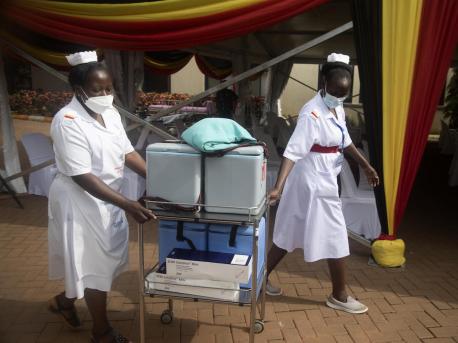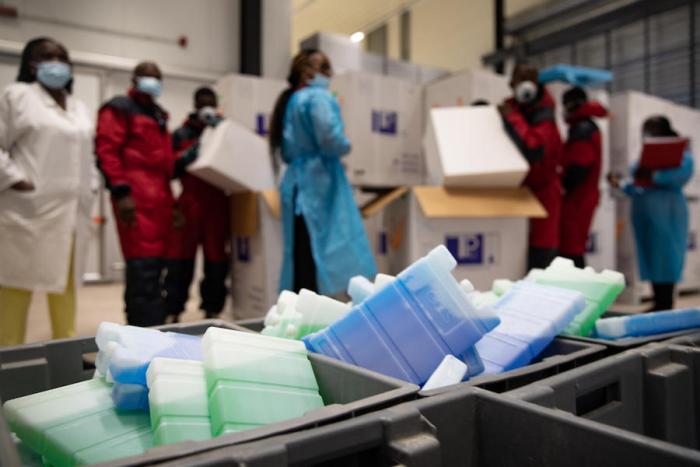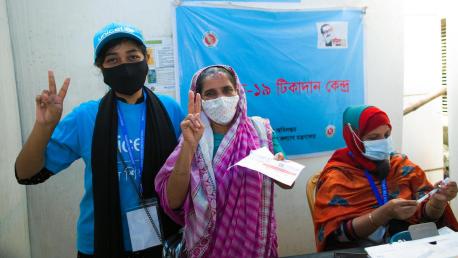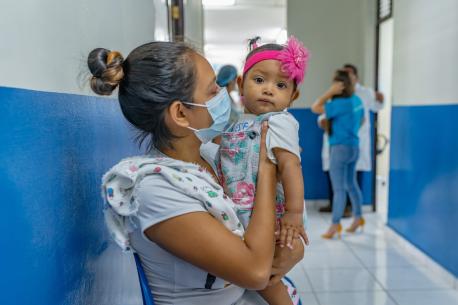
Using the Cold Chain to Safely Deliver COVID-19 Vaccines
UNICEF is leading on procurement and delivery of COVID-19 vaccines for the COVAX Facility, using its networks, buying power and expertise to get 2 billion vaccine doses to more than 180 countries in 2021.
On February 24, 2021, the first tranche of COVID-19 vaccines procured through the COVAX Facility touched down in Accra, Ghana. The shipment, which originated from a facility in Pune, India, was met by government officials and representatives from UNICEF and the World Health Organization, marking the official start of the largest and fastest vaccine supply operation in history.
Since then, 60 countries have received 32 million COVID-19 vaccine doses through COVAX — a multilateral initiative led by the WHO and GAVI, the Global Vaccine Alliance, to ensure equitable distribution of approved vaccines around the world. As head of procurement and supply for COVAX, UNICEF will coordinate delivery of up to 2 billion doses of COVID-19 vaccines, including 1.2 billion doses to low- and lower-middle-income countries, in 2021.
UNICEF delivers immunizations to scale through the “cold chain”
As the largest single vaccine buyer in the world, UNICEF delivers routine immunizations to children in over 100 countries every year through a carefully constructed, multifarious system called the cold chain. The vaccine cold chain is a global network of cold rooms, freezers and transportable cold boxes and carriers that keep vaccines at a controlled temperature from the manufacturing stage all the way to point of vaccination.
There are often several stops on this journey — for those living in remote regions, vaccines could be delivered to their local community health center by a health worker on foot, after being transported by planes, boats and motorcycles between the original laboratory, national and regional storage facilities and interim hospitals and health clinics. Given the scale of the COVAX rollout, UNICEF signed a charter through the World Economic Forum with major logistics operators to prioritize the transport and distribution of COVID-19 immunizations through the existing infrastructure, anticipating 850 tons of deliveries per month. UNICEF is also supporting governments in-country by carrying out trainings with health care workers in administering, storing and disposing of injection devices.

On March 3, 2021, cold chain staff unpack COVID-19 vaccines in the cold room of the vaccine storage warehouse in Kinkole commune, Kinshasa, Democratic Republic of the Congo. More than 1.7 million doses of AstraZeneca/Oxford COVID-19 vaccines arrived in Kinshasa on March 2 by cargo plane, shipped through the COVAX Facility. © UNICEF/UN0424962/Desjardins
To keep their potency, most vaccines in broad use today need to be stored at temperatures between 36 and 46 degrees Fahrenheit, which can be accomplished by the average home refrigerator. The AstraZeneca/Oxford COVID-19 vaccine can be kept within this range, while the Moderna vaccine needs to be stored at -4 degrees, equal to a regular freezer.
The Pfizer-Biotech vaccine needs to be stored at -94 degrees Fahrenheit — colder than winter in Antarctica — classifying it as an ultra-cold chain formulation and making it even harder to preserve in regions without consistent electricity or refrigeration. A recent survey of 730 health centers in the COVAX-participant countries of Cambodia, Ethiopia, Kenya, Myanmar, Nepal and Niger showed that 25 percent had no access to electricity, and another 25 percent regularly experienced outages that affected the capacity to deliver services.
Innovative technology allows UNICEF to extend the cold chain to the “last mile”
Direct-drive solar-powered refrigeration provides a cutting edge, environmentally sustainable and cost-effective solution to maintaining consistent temperature control in challenging circumstances. This technology, which is directly wired to solar photovoltaic panels, freezes water and other cold storage appliances to keep vaccines cool during the night and for several days no matter the weather. Solar direct-drive systems provide an alternative to kerosene-, gas- and battery-powered solar refrigerators, which require frequent and expensive maintenance and may not be feasible in the most underserved, remote areas of the world.
UNICEF is currently working with countries to map out the types of technologies best suited to each locale and collaborating with partners to add new infrastructure and strengthen existing systems where needed. As part of its preparations for the COVAX immunization drive, UNICEF began purchasing nearly 92,000 vaccine fridges in late 2020 — including 11,325 solar-powered ones — as well as cold boxes and vaccine carriers to strengthen cold chain capabilities.

UNICEF staffer Preena Shrestha (left) and Mitthi Jirel, a staff member at the district hospital in Jiri in Dolakha District in northeastern Nepal, discuss the proper packing of vaccine boxes in the hospital's vaccine store room on February 26, 2021. © UNICEF/UN0422894/Prasad Ngakhusi
UNICEF has been preparing for this moment for 75 years
For 75 years, UNICEF has worked with partners to protect the health and rights of children and families. Year in and year out, UNICEF reaches almost half the world’s children with lifesaving vaccines — no other organization has the infrastructure, expertise and experience to successfully carry out an operation of this magnitude. The knowledge gained from years of experience in delivering vaccines has prepared UNICEF for this moment. Investments in this mass COVID-19 immunization campaign, in turn, will strengthen and build even better systems for vaccine delivery in the future.
Your generosity can help support UNICEF's work to ensure equitable, affordable access to COVID-19 vaccines for every country, regardless of income. Please donate.
Top photo: Health workers move vaccine cooler boxes to vaccination points at the official launch of Uganda's COVID-19 vaccination campaign at Mulago National Referral Hospital on March 10, 2021. Uganda received the first consignment of 864,000 doses of COVID-19 vaccines from the COVAX Facility on March 5, 2021. © UNICEF/UN0428776/Bongyereirwe
HOW TO HELP
There are many ways to make a difference
War, famine, poverty, natural disasters — threats to the world's children keep coming. But UNICEF won't stop working to keep children healthy and safe.
UNICEF works in over 190 countries and territories — more places than any other children's organization. UNICEF has the world's largest humanitarian warehouse and, when disaster strikes, can get supplies almost anywhere within 72 hours. Constantly innovating, always advocating for a better world for children, UNICEF works to ensure that every child can grow up healthy, educated, protected and respected.
Would you like to help give all children the opportunity to reach their full potential? There are many ways to get involved.




